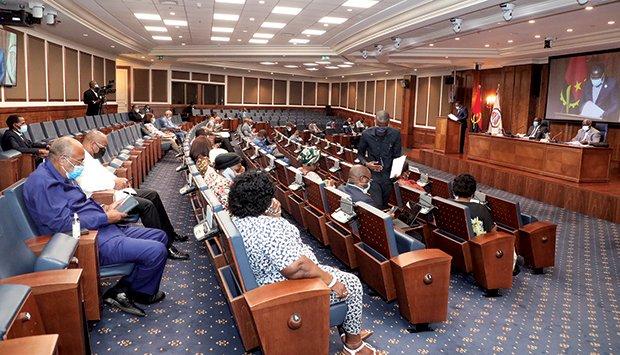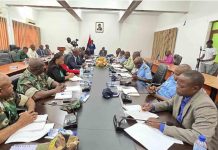Africa-Press – Angola. The new Code of Administrative Procedure, under discussion in the National Assembly, places the rights of those administered at the center of government attention. The legal diploma was approved yesterday, in the specialty, after three consecutive days of discussion and approval, article by article.
The future Code of Administrative Procedure, to be approved on 24 March, implements the advances in the fundamental rights of citizens, contained in the Constitution, approved in 2010. The administrative legislation in force in Angola is based on the Constitutional Law of 1992, and completely outdated, given the new constitutional framework in the country and the growing satisfaction of citizens’ interests.
The norms of the future Code of Administrative Procedure were considered by the deputies as revolutionary and that they demand from the General State and better preparation of its agents so that the new law is applied as foreseen. The deputies, for the purposes of dissemination and training of all public servants from top to bottom, approved the period of 180 days for the document to enter into force.
The technical discussion was intense between the deputies and the team of the Administrative Law Reform Commission, led by academic and professor Carlos Feijó. On the last day of the discussions, only MPLA deputies presented ideas, questions and suggestions for improving the diploma.
No opposition deputy intervened. Parliamentarian António Paulo was one of the most eloquent voices in the debate. He demonstrated the academic vein for the precision of the arguments when he said it was necessary to clarify the issue of administrative regulations of autonomous regulations.
António Paulo said that there has been more concern with the direct administration of the State, in terms of regulation, than the indirect administration of the State. The MPLA deputy asked for greater concern with the administrative activity of public companies and also of public institutes.
Deputy João Pinto asked for greater consideration in advancing innovations in the Code of Administrative Procedure. He said that weighting is the best way to introduce innovations, taking into account the Angolan reality.
Deputy Tomás Silva said that making legislative changes is much easier, but making changes in mentality is even more difficult. Tomás Silva asked that there be an intense work of training the administrative agents and also greater dissemination of the document, after approval.
The deputy Lourdes Caposso, the only female voice that was part of the debate and with greater intensity, said that the Code brings a revolution and puts the administered in the center of attention.
“Today, the profile of human capital, to be a governor, a minister, someone who makes his/her life an administrative activity will be much more rigorous, because the administrative act, the administrative regulation, the administrative contracts, that is, all the administrative it will be much more rigorous, in the sense of giving the administrative authority to contest, challenge and ask for reasons for any administrative act”, he said.
Lourdes Caposso said that whenever the Public Administration takes a decision against a worker, the worker has the possibility to ask for clarification, to suggest the insertion of new elements. “We are facing a revolution in administrative law, which is why we have approved a long period to allow people to train and get informed, so that there is greater dissemination of this magnificent Code of Administrative Procedure”, he underlined, noting that there is no fear with the approval. of the new Administrative Code and its entry into force. “Based on this Code, the administrator is at the center of attention”, he concluded.
Deputy José Semedo considered that the Code brings several novelties, in the universe of 280 articles and that the diploma will require a different attitude from the Public Administration, in the face of the acts that it performs.
“The State will have to take care of the awareness, training and accountability of its agents. Through this Code, citizens will have their rights better protected, they will have access to the Law and the protection of effective jurisdiction, in a more concrete way. , so in one word I would say the following: this is a true revolution, in the positive sense, of our Public Administration”, he said.
The Secretary of State for Justice, Orlando Fernandes, said that in the coming years it will be difficult to hold positions of minister, secretary of state, governor, administrator or other leadership roles in the public service.
Orlando Fernandes was speaking on the way out in one of the rooms of the National Assembly where the proposed law approving the new Code of Administrative Procedure was discussed and approved, which provides for several rules with more rights for those administered and rules that hold public servants accountable.
“I feel sorry for those who will be future ministers, governors and administrators…”, he said, visibly serious, and added that those who perform their duties in a messy way will feel the pressure of citizens with the actions to be brought in the courts and also pressure from the State to see compensation for the damage caused by public servants.
“The question of the right of return has been more properly posed, in the scope of the law on extra-contractual civil liability of the State and legal persons governed by public law, for acts actually performed. public management as well as private management with the State, it is said, in the law in question, that if there is civil liability, the State compensates and then has the right of recourse on the official who, by chance, has caused the damage”, he explained.
From a practical point of view, he pointed out, this means that if the official causes damage, for example, of 10 thousand kwanzas and, if the State is sued, the action is brought in the courts, the State pays 10 thousand kwanzas as compensation. , but then goes to the employee’s salary to recover this amount (10 thousand). “So it’s the citizen who caused the damage and the state doesn’t lose out,” he clarified.
The Secretary of State said that the new Code of Administrative Procedure represents a major evolution in terms of administrative law, it is a profound reform in terms of administrative law.
For More News And Analysis About Angola Follow Africa-Press






